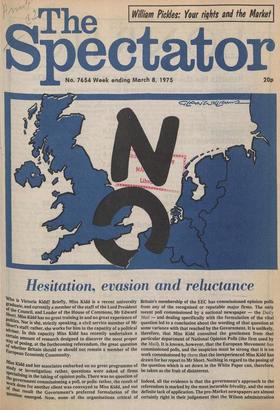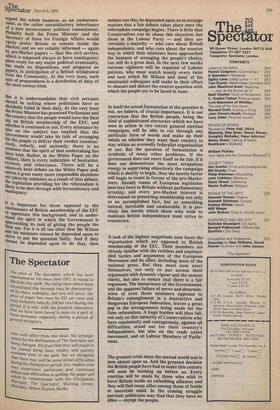Hesitation, evasion and reluctance
Who is Victoria Kidd? Briefly, Miss Kidd is a recent university graduate, and currently a member of the staff of the Lord President the Council, and Leader of the House of Commons, Mr Edward "°rt• Miss Kidd has no great training in and no great experience of ,r)°,_lities. Nor is she, strictly speaking, a civil service member of Mr o_ri. ores staff: rather, she works for him in the capacity of a political 4enviser. In this capacity Miss Kidd has recently undertaken a :lain amount of research designed to discover the most proper „eaY of Posing, at the forthcoming referendum, the great question whether Britain should or should not remain a member of the uroPean Economic Community.
sstudy Kidd and her associates embarked on no great programme of or investigation: rather, questions were asked of firms trcialising in the taking of opinion polls. There was no question of wo orgk°vernment commissioning a poll, or polls: rather, the result of for another client was conveyed to Miss Kidd, and out ju th done at result the Government's preferred formulation of the estion emerged. Now, none of the organisations critical of Britain's membership of the EEC has commissioned opinion polls from any of the recognised or reputable major firms. The only recent poll commissioned by a national newspaper — the Daily Mail — and dealing specifically with the formulation of the vital question led to a conclusion about the wording of that question at some variance with that reached by the Government. It is unlikely, therefore, that Miss Kidd consulted the gentlemen from that particular department of National Opinion Polls (the firm used by the Mail). It is known, however, that the European Movement has commissioned polls, and the suspicion must be strong that it is on work commissioned by them that the inexperienced Miss Kidd has drawn for her report to Mr Short. Nothing in regard to the posing of the question which is set down in the White Paper can, therefore, be taken as the fruit of disinterest.
Indeed, all the evidence is that the government's approach to the referendum is marked by the most incurable frivolity, and the most definite lack of application. The pro-Market newspapers are almost certainly right in their judgement that the Wilson administration regard the whole business as an embarrassment, as the rather unsatisfactory inheritance of a now inconvenient political commitment. Probably both the Prime Minister , and the Secretary of State for Foreign Affairs would vastly prefer Britain to remain inside the Market; and we are reliably informed — again by pro-Market papers — that the civil service, Which is supposed always to have contingency Plans ready for any major political eventuality, has made no dispositions, and prepared no Papers, in anticipation of a British withdrawal from the Community. At the very least, such lack of preparedness is a dereliction of duty of the most serious kind.
But it is understandable that civil servants Should be lacking where politicians have so decidedly failed in their duty. At the very least the Prime Minister has promised Parliament and the country that the people would have the final say on British membership of the EEC, and Whether it continued or not. Every utterance by him on the subject has implied that the Government would take its task of arranging for the people to deliver their verdict constructively, soberly, and seriously: there is no evidence that the spirit of that undertaking has been kept. Rather, in the White Paper on the subject, there is every indication of hesitation, evasion, and reluctance. There will be a relatively brief debate on the White Paper and, unless a great many more responsible decisions are taken by ministers as a result of that debate, the legislation providing for the referendum is likely to be shot through with inconsistency and inadequacy.
It is important for those opposed to the continuance of British membership of the EEC to appreciate this background, and to understand the spirit in which the Government is a.Pproaching its task of giving the people the final say. For it is all too clear that Mr Wilson and his ministers cannot be depended upon to strive to put the question fairly. And if they cannot be depended upon to do that, then neither can they be depended upon so to arrange matters that a fair debate takes place once the referendum campaign begins. There is little that Conservatives can do about this situation; but those in the Labour Party — and they are certainly a majority — who care about British independence, and who care about the wanton way in which their ministers have approached the bnsiness of arranging the people's choice, can still do a great deal. In the next few weeks extreme vigilance will be required of Labour patriots, who must watch keenly every twist and turn which Mr Wilson and most of his ministerial colleagues will make in their effort to obscure and distort the central question with which the people are to be faced in June.
In itself the actual formulation of the question is not, we believe, of crucial importance. It is our conviction that the British people, being the kind of sophisticated electorate which we have seen in action in two recent general election campaigns, will be able to cut through any particular form of words and make up their minds on whether they want their country to stay within an avowedly federalist organisation or not. But the question of formulation is symbolic of many other problems. If the government does not exert itself to be fair, if it does not demonstrate the most scrupulous energy in supervising objectively the campaign which is shortly to begin, then the inertia factor will begin to count in favour of the pro-Marketeers. Already reams of European legislation pass into force in Britain without parliamentary scrutiny, and every pro-Market interest is determined on presenting membership not only as an accomplished fact, but as something natural, inevitable and unalterable. It is precisely this inertia which those who wish to maintain British independence must strive to counteract.
A task of the highest magnitude now faces the organisation which are opposed to British membership of the EEC. Their members are already familiar with the ruthless and unprincipled tactics and arguments of the European Movement and its allies, including most of the national press. But they must now exert themselves, not only to put across their arguments with dynamic vigour and the utmost clarity, but also to ensure that there is a fair argument. The insouciance of the Government, and the apparent failure of nerve and determination of even those ministers opposed to Britain's entanglement in a destructive and dangerous European federation, leaves a great gap in the arrangements being made for the June referendum. A huge burden will thus fall, not only on that minority of Conservatives who have consistently and courageously, against all difficulties, stood out for their country's independence, but also on the trade union movement, and on Labour Members of Parliament.
The greatest crisis since the second world war is now almost upon us. And the greatest decision the British people have had to make this century will soon be looming up before us. Every exertion will be made by those who wish to leave Britain inside an enfeebling alliance; and they will find many allies among those of feeble or uncertain mind. In the coming struggle patriotic politicians may find that they have no allies — except the people.











































